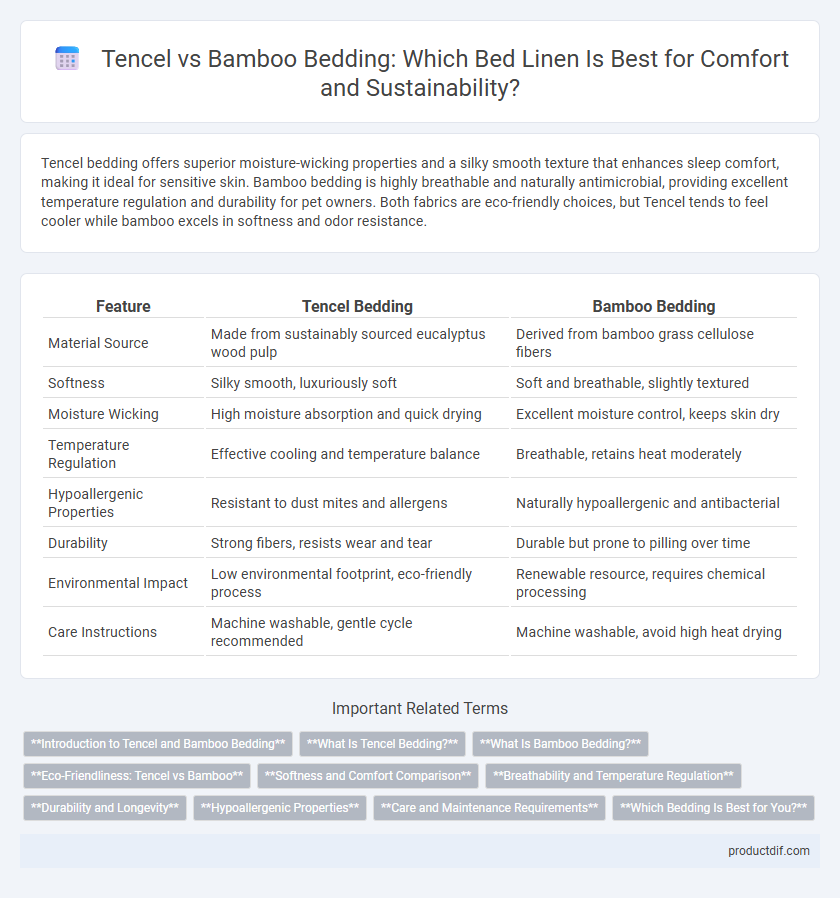Tencel bedding offers superior moisture-wicking properties and a silky smooth texture that enhances sleep comfort, making it ideal for sensitive skin. Bamboo bedding is highly breathable and naturally antimicrobial, providing excellent temperature regulation and durability for pet owners. Both fabrics are eco-friendly choices, but Tencel tends to feel cooler while bamboo excels in softness and odor resistance.
Table of Comparison
| Feature | Tencel Bedding | Bamboo Bedding |
|---|---|---|
| Material Source | Made from sustainably sourced eucalyptus wood pulp | Derived from bamboo grass cellulose fibers |
| Softness | Silky smooth, luxuriously soft | Soft and breathable, slightly textured |
| Moisture Wicking | High moisture absorption and quick drying | Excellent moisture control, keeps skin dry |
| Temperature Regulation | Effective cooling and temperature balance | Breathable, retains heat moderately |
| Hypoallergenic Properties | Resistant to dust mites and allergens | Naturally hypoallergenic and antibacterial |
| Durability | Strong fibers, resists wear and tear | Durable but prone to pilling over time |
| Environmental Impact | Low environmental footprint, eco-friendly process | Renewable resource, requires chemical processing |
| Care Instructions | Machine washable, gentle cycle recommended | Machine washable, avoid high heat drying |
Introduction to Tencel and Bamboo Bedding
Tencel bedding is made from sustainably sourced eucalyptus wood using an eco-friendly closed-loop process that produces soft, breathable, and moisture-wicking fabric ideal for sensitive skin. Bamboo bedding, crafted from bamboo pulp, offers naturally hypoallergenic, antimicrobial properties and excellent temperature regulation, making it perfect for hot sleepers. Both textiles provide eco-conscious alternatives to traditional cotton, combining comfort with sustainability for high-quality bed linens.
What Is Tencel Bedding?
Tencel bedding is made from lyocell fibers derived from sustainably harvested eucalyptus trees, offering a soft, breathable, and moisture-wicking fabric ideal for regulating body temperature during sleep. This eco-friendly material is known for its hypoallergenic and antimicrobial properties, making it suitable for sensitive skin and reducing allergens in the bedroom. Compared to bamboo bedding, Tencel sheets provide enhanced durability and a smoother, silk-like feel while maintaining excellent moisture management.
What Is Bamboo Bedding?
Bamboo bedding is made from fibers derived from the bamboo plant, known for its natural antibacterial properties and moisture-wicking ability. It offers a soft, breathable fabric that regulates temperature, making it suitable for both warm and cool climates. Eco-friendly and biodegradable, bamboo bedding provides a sustainable alternative to traditional cotton sheets.
Eco-Friendliness: Tencel vs Bamboo
Tencel bedding is produced from sustainably harvested eucalyptus trees using a closed-loop process that recycles water and solvents, significantly reducing environmental impact. Bamboo bedding, while derived from a fast-growing renewable resource, often involves chemically intensive processing that can harm ecosystems unless certified organic or manufactured with eco-friendly methods. Both options offer biodegradable materials, but Tencel consistently ranks higher in eco-friendliness due to its lower water usage and minimal chemical waste during production.
Softness and Comfort Comparison
Tencel bedding, made from eucalyptus wood fibers, offers exceptional softness with a smooth, silky texture that enhances comfort and breathability. Bamboo bedding boasts a naturally silky feel and excellent moisture-wicking properties, providing a cool and comfortable sleep experience. Both materials are hypoallergenic and gentle on sensitive skin, but Tencel tends to feel slightly softer and more luxurious, while bamboo excels in temperature regulation.
Breathability and Temperature Regulation
Tencel bedding excels in breathability due to its moisture-wicking fibers derived from eucalyptus trees, effectively regulating temperature by dissipating heat and keeping sleepers cool. Bamboo bedding also offers strong breathability benefits, as its natural hollow fiber structure promotes airflow and absorbs moisture to maintain a comfortable sleep environment. Both materials outperform traditional cotton in temperature regulation, making them ideal for hot sleepers or those seeking enhanced thermal comfort.
Durability and Longevity
Tencel bedding, made from lyocell fibers derived from eucalyptus trees, offers exceptional durability due to its strong fiber structure and resistance to wear and tear over time. Bamboo bedding, crafted from bamboo viscose, is also durable but tends to be less resilient under frequent washing and prolonged use compared to Tencel. Both materials provide longevity, but Tencel bedding typically maintains its softness and integrity longer through repeated laundering cycles.
Hypoallergenic Properties
Tencel bedding is derived from eucalyptus wood pulp and naturally inhibits the growth of bacteria, making it hypoallergenic and ideal for sensitive skin. Bamboo bedding also exhibits strong hypoallergenic properties due to its antimicrobial and moisture-wicking capabilities, reducing the risk of allergens like dust mites and mold. Both options offer superior breathability and softness, but Tencel tends to be more sustainable and gentle for allergy sufferers.
Care and Maintenance Requirements
Tencel bedding is known for its durability and resistance to wrinkles, requiring gentle machine washing in cold water and air drying to maintain fabric softness and longevity. Bamboo bedding demands careful washing in cold water on a delicate cycle, avoiding bleach and high heat drying to prevent fiber weakening and preserve its natural moisture-wicking properties. Both materials benefit from minimal ironing and avoiding fabric softeners to extend their lifespan and optimize comfort.
Which Bedding Is Best for You?
Tencel bedding offers exceptional moisture-wicking properties and a silky smooth texture, making it ideal for sensitive skin and hot sleepers. Bamboo bedding boasts natural antibacterial qualities and sustainable production, perfect for eco-conscious consumers seeking hypoallergenic comfort. Choosing between Tencel and bamboo depends on your preference for breathability, softness, and environmental impact.
Tencel Bedding vs Bamboo Bedding Infographic

 productdif.com
productdif.com